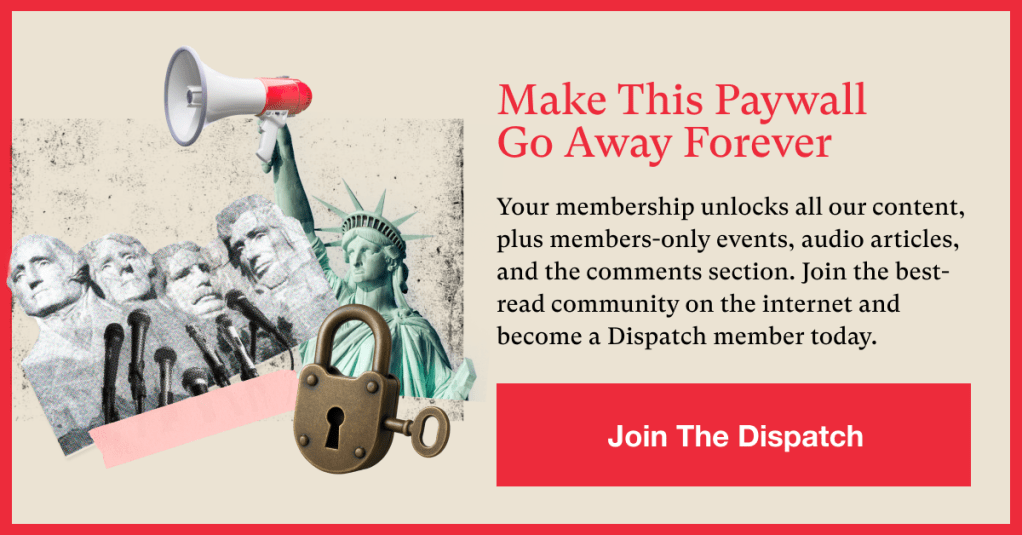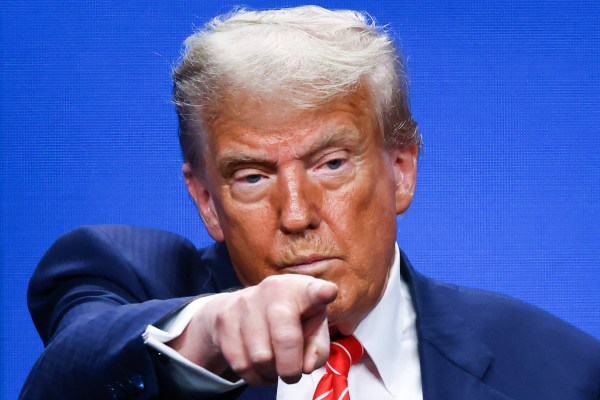The Dispatch is proud to provide educators, clergy, retirees, military veterans, and students discounted access to our journalism. Check out the list and apply here if one of these categories applies to you.
If you want to get clear about the chaos over at Robert F. Kennedy Jr.’s Department of Health and Human Services, I have an explanation that seems to me to have at least some utility, though many readers will find it mean-spirited or cranky: A big part of the problem is that there is a junkie in charge.
One of the things you will learn if you spend enough time around drug addicts is that the controlling variable isn’t the drug but the addict. Another way of expressing that—and I would like to communicate this with all necessary charity but with no more charity than is necessary, inasmuch as clarity is here paramount—is that a heroin addict becomes a heroin addict owing to factors that have less to do with the character of opiate and opioid drugs than with the character of the man or woman in question. It is much the same with other intoxicants: About six and a half years of my life are pretty blurry (alas, some moments are not as blurry as I would prefer!), a fact that is only incidentally related to the chemical composition of Wild Turkey 101 but much more directly related to the psychological and moral composition of your obedient correspondent, who has a terrible habit of going through life as though everything worth doing were worth overdoing.
(You know those people who insist that they have “no regrets”? I am not one of them.)
There are two great books about addiction that I recommend to people, one of them fiction and one of them nonfiction. Regular readers here will not be surprised to learn that the fiction is David Foster Wallace’s landmark novel, Infinite Jest, or that the nonfiction entry is Theodore Dalrymple’s Romancing Opiates: Pharmacological Lies and the Addiction Bureaucracy, a brief and enormously intelligent book that I am not alone in regarding as possibly the finest monograph of its kind. Theodore Dalrymple is known, off the shelf, as Dr. Anthony Daniels, an English prison physician and psychiatrist (the nom de plume spares the actor who played C-3PO a good deal of hate mail, no doubt) whose work on addiction is informed in considerable part by his time working at the Winson Green prison in Birmingham, England.
As a non-paying reader, you are receiving a truncated version of Wanderland. You can read Kevin's full newsletter by becoming a member here.
One of the eye-opening aspects of Romancing Opiates is the very large gulf between the Hollywood version of opiate withdrawal—the version regnant in the popular imagination—and the doctor’s own firsthand observations. He introduces these quoting a passage from the standard medical textbook on the subject:
The acute opioid withdrawal syndrome is a time-limited phenomenon, generally of brief duration. Following the abrupt termination of short-acting opioids such as heroin, morphine, or hydromorphone, withdrawal signs and symptoms usually subside on the second or third opioid-free day. Although uncomfortable for the addict, the opioid withdrawal syndrome, in contrast to the syndrome associated with the withdrawal of other drugs such as benzodiazepines and alcohol, does not pose a medical risk to the individual.
That is fortified by similar quotations from similarly authoritative sources, from The Oxford Textbook of Medicine to Emergency Management of Selected Drugs of Abuse, which was published by the American College of Emergency Physicians. This is not a bespoke, eccentric theory of Dr. Daniels’. Of his own experience, he writes:
As it happens, I have seen a large number of withdrawing addicts in the prison in which I work. Of the several hundreds I have seen in the last decade, not a single one has ever caused me as doctor to feel anxiety for his safety on account of his withdrawal (they sometimes have had dangerous illnesses as a result of their injecting habits, and they are often severely malnourished, starving even, but that is another matter). None has ever had a symptom requiring hospitalization, and all the genuine symptoms, never severe, have been relieved by simple, non-opiate medication.
It is true that the majority of them portray themselves to me as being in the grip of terrible suffering-suffering that they say is physical in nature, not mental. They hunch themselves up, they writhe in histrionic agony. They claim that they have experienced nothing as bad in the whole of their lives, that it is quite unendurable, and they make all kinds of threats if I do not prescribe something (by which they mean an opiate) to alleviate their suffering, threats that range from damaging or setting fire to their cells, to killing themselves, others or even me. … Those who say they are suicidal withdraw their threat, and tell me they were merely trying to get me to prescribe, when I suggest that they be put in what is known as an anti-ligature cell, that is to say, a cell so bare that there is nowhere from which to suspend a noose. This cell is bare also of the usual amenities, such as a kettle and a television, and the prospect of a night in it produces a confession that they were only "blagging," that is to say, trying to pull the wool over my eyes. … It’s all a game of poker, and they have lost, at least until they meet someone who takes everything they say at face value.
Simple observation demonstrates that much of what they say about themselves is simply not true. When, unbeknown to them, I have observed them before they entered my consulting room, and again after they have left it, they display a completely different kind of behavior to that which they exhibit once inside it. Gone is the hunched posture, the woebegone expression of martyrdom, the affecting scene of someone in extremis, or nearly so: they are talking or joking animatedly among themselves, and walk with quite a different step. News of what the doctor is prescribing, or not prescribing, spreads at computer-like speeds among them.
(May I make explicit my implicit suggestion that you buy a copy of this book and read it immediately if you have not?)
There is nothing like direct experience. In one of my favorite passages from Infinite Jest, Wallace (himself an addict with mental health problems who ultimately killed himself) has one of his fictitious addicts, Don Gately, a resident at a halfway house, meditate on the sense of metaphysical entitlement that makes so many addicts unable to forge a mental link between action and consequence even in something as minor as following parking rules:
Their early-recovery Denial makes it impossible for them to imagine their own car getting towed instead of, say, somebody else’s car. It’s the same Denial Gately can see at work in the younger B.U. or -C. students when he’s driving Pat’s Aventura to the Food Bank or Purity Supreme when they’ll fucking walk right out in the street against the light in front of the car, whose brakes are fortunately in top shape. Gately’s snapped to the fact that people of a certain age and level of like life-experience believe they’re immortal: college students and alcoholics/addicts are the worst: they deep-down believe they’re exempt from the laws of physics and statistics that ironly govern everybody else. They’ll piss and moan your ear off if somebody else fucks with the rules, but they don’t deep down see themselves subject to them, the same rules. And they’re constitutionally unable to learn from anybody else’s experience: if some jaywalking B.U. student does get splattered on Comm. or some House resident does get his car towed at 0005, your other student’s or addict’s response to this will be to ponder just what imponderable difference makes it possible for that other guy to get splattered or towed and not him, the ponderer. They never doubt the difference—they just ponder it. It’s like a kind of idolatry of uniqueness. It’s unvarying and kind of spirit-killing for a Staffer to watch, that the only way your addict ever learns anything is the hard way. It has to happen to them to like upset the idolatry.
What each of these writers is getting at, each in his own inimitable way, is that the drug addict is a personality type, a familiar sort of character. The quality of being an addict does not entirely define a man or a woman, because an addict is not the only thing he or she is. But to the degree that addiction is the predominating feature of a man’s personality, he will in many ways resemble other men so afflicted, in much the same way that men who are lecherous tend to resemble one another, as do men who are religious fanatics (irrespective of dogma!) or con artists or vegans. When I remarked to a friend that a mutual musical acquaintance of ours seemed not quite right, he responded, as though it were the most obvious thing in the world: “Viola player. You know.” (In case you’re wondering: No, that friend was not Jay Nordlinger.)
It is true of political types, too: “How monotonously alike all the great tyrants and conquerors have been!” C.S. Lewis observed. (Yes, and: “How gloriously different are the saints.”) Tyrants even come to resemble one another insofar as taste is concerned, which is why Kim Jong-un and Donald Trump seem to employ the same interior decorator, and why the aesthetic touchstones of the Berlin that Adolf Hitler wanted to build (with its emphasis on giganticism melded to a version of classicism) also inform Trump’s aesthetic ambitions for Washington: compare and contrast. (This is not new for American political leaders: If the American Nazi Party had the funds for a decent headquarters, it would probably look a lot like Paul Cret’s fashy Federal Reserve building, dedicated by Franklin Roosevelt in 1937.) It is difficult to tell a right-wing conspiracy kook from a left-wing conspiracy kook—really: Which one is Bobby Kennedy Jr.? What defines him is not a place on the right-left spectrum but the fact that he is a kook. And the movement he leads, like the movement Trump leads, is much less like a conventional political faction than it is like a cult.
Infinite Jest contains some very amusing speculation about whether Alcoholics Anonymous is a cult.
(There are some definite cultish, brainwashy elements to the AA Program (the term Program itself resonates darkly, for those who fear getting brainwashed), and Gately tries to be candid with his residents re this issue. But he also shrugs and tells them that by the end of his oral-narcotics and burglary careers he’d sort of decided the old brain needed a good scrub and soak anyway. He says he pretty much held his brain out and told Pat Montesian and Gene M. to go ahead and wash away.)
I have come to believe that AA is, as Wallace suggested, a kind of cult (I associate only with respectable cults, Levantine wine cults, to be specific, imported vintages with a minimum of 2,000 years in the cask) and that one of the 12-step articles of faith is, in the main if not without exception, true: There is no such thing as a former addict.
Kennedy, who became a heroin user in his teens, is an advocate of 12-step programs and at one point described himself as attending support group meetings daily. But, of course, Kennedy is a habitual liar (“They’ll piss and moan your ear off if somebody else f—s with the rules, but they don’t deep down see themselves subject to them, the same rules”) who often contradicts himself within the same sentence. So you never know. Asked about the role of steroid use in his famous fitness program, he denied being a steroid user, then added that he took supplemental testosterone, testosterone being, of course, the fundamental anabolic-androgenic steroid hormone. Which is to say, the secretary of health and human services said he doesn’t take steroids, except for the steroids he takes. There is not anything inherently bad about testosterone supplementation, which can provide real quality-of-life benefits to some men. But it is an abusable drug, too—it is worth keeping in mind that most people who try cocaine or heroin never become cocaine or heroin addicts.
See if this sounds familiar at all:
The most prominent psychiatric features associated with ... abuse are manic-like presentations defined by irritability, aggressiveness, euphoria, grandiose beliefs, hyperactivity, and reckless or dangerous behavior.
Is that our Bobby they’re talking about? I think it may be.
Other psychiatric presentations include the development of acute psychoses, exacerbation of tics and depression, and the development of acute confusional/delirious states. Extreme variability of symptom presentation exists because of differences in the dose consumed, agent used, duration of use, personality type of the abuser, and current or previous use of other recreational drugs.
That is from a 2005 edition of Psychosomatics (now called the Journal of the Academy of Consultation-Liaison Psychiatry), in an article titled “Psychiatric Complications of Anabolic Steroid Abuse.” My thesis here isn’t that the secretary of health and human services acts like a crazy person because he takes drugs—it is that he takes drugs because he is, in fact, a crazy person, one whose career as public fraud, like his career as a private junkie, is characterized by “manic-like presentations defined by irritability, aggressiveness, euphoria, grandiose beliefs, hyperactivity, and reckless or dangerous behavior.”
Kennedy’s thinking is junkie thinking: When within the space of a few sentences he insisted that COVID vaccines kill people and that Donald Trump deserves a Nobel prize for his role in implementing Operation Warp Speed, which developed the COVID vaccines, Kennedy took umbrage (“defined by irritability, aggressiveness”) at the notion that these two positions must be mutually exclusive. He is very much like Wallace’s addicts with their sense of metaphysical uniqueness and specialness: Everything that he wants to be true must be true and true at the same time, simply because he is “exempt from the laws of physics and statistics”—and logic—“that ironly govern everybody else.”
Some of you may have experienced this: You have a friend who had a terrible drug problem or drinking problem—or, possibly, a terrible mental health issue—from which he finally recovers, at which point you make an unhappy discovery: He is still a jerk, or very needy, or manipulative, or some other kind of a mess. (Some of us even may have made that discovery about ourselves.) As it turns out, there was a problem with the heroin or the bourbon or the untreated depression or whatever, but that problem wasn’t the only problem. There is a reason most people who sometimes take drugs never become addicts but some do, why some people can enjoy the occasional cocktail and some will drink as though their goal were the extinction of consciousness (which it may be), why people who are vulnerable to addiction to one drug also are vulnerable to addiction to other, unrelated drugs or to entirely unrelated psychic salves of one kind or another, from religion to conspiracy theory (which is another kind of religion) to sexual promiscuity to shopping. There is a reason so many people who join cults join more than one over the course of their careers as cultists. Some happier types, such as a few fitness fanatics I know, are able to transfer their compulsive tendencies in some healthier direction.
The secretary of health and human services is a man with a history of drug addiction and, it is worth remembering, a drug felon as well. There are some excellent men who have that kind of thing and more on their résumés, and they can and do play valuable roles in public life—when they have become stable, responsible, reformed men. Bobby Kennedy Jr. is not one of those—the most he could say for himself is that he doesn’t shoot up heroin anymore. It is good that he made the effort to stop using heroin, but that does not make him a reformed man. He is a crackpot, a liar, and a menace in public life.
That Kennedy is being enabled in his destruction of critical public institutions by such figures as Sen. Roger Marshall, a Republican from Kansas and a doctor, is shameful. As is the fact that he has made a fool of Sen. Bill Cassidy, a Louisiana Republican who also is a doctor and who, as chairman of the Senate’s health committee, helped put Kennedy into place. During Kennedy’s confirmation he pretended to take as credible a junkie crackpot’s promises to conduct himself responsibly once in office—surely not because Sen. Cassidy is dumb enough to have believed the junkie crackpot but because he is a political coward who is so afraid of Donald Trump and a few dolts on social media that he refuses to do his job as a senator and committee chairman entrusted with oversight powers.
Ask anyone with experience: A junkie’s promise is not worth very much. Kennedy may have stopped taking heroin but his promises shouldn’t be trusted. He did not become honest, trustworthy, or honorable—because what is wrong with him is only incidentally linked to his heroin use, and the vector of causality points in the opposite direction from what most people would assume: It wasn’t drug addiction that made him an irresponsible and dishonest fool—it was the aspects of his character that made him a certain particular kind of irresponsible and dishonest fool that also led to his chemical misadventures.
Robert F. Kennedy Jr. is the kind of junkie who gives junkies a bad name.
Economics for English Majors
Not great news on the labor front. From the Wall Street Journal:
U.S. job growth continued to slow down in August, with just 22,000 new jobs—a sign that the labor market is deteriorating markedly.
Friday’s report adds to a summer of slow hiring and points to a stagnant job market that has lengthened job searches, shut young people out of employment and increased unemployment for Black workers.
The Labor Department’s report also highlighted weakness from earlier in the year. The government revised its numbers from previous months and said that the economy lost a net 13,000 jobs in June. It was the first such decline since December 2020.
Which raises the question: Whom will Trump fire this time? Surely one more lost job won’t make a difference in the stats. The U.S. economy has lost some 78,000 manufacturing jobs this year. There is a great deal of normal organic churn in manufacturing as in every other sector—but mucking up worldwide supply chains and injecting a great deal of expensive uncertainty into the marketplace cannot be helping. Trump’s trade policy is idiotic and amateurish, and his economic advisers are almost without exception either incompetents (a few) or sycophants (a whole bunch). “The buck stops here,” was Harry Truman’s slogan. Not so much Donald Trump’s. A note to the Trump policy team: You dopes are destroying everything you touch, and getting to ride along in the shiny airplane with the big man is not worth the damage you are doing to the country, to say nothing of what remains of your reputations.
Words About Words
Junkie is attested to as far back as 1923, with the now-discarded junker found a year earlier. Junk meaning any narcotic drug is assumed to be older but is attested to only from 1925, according to the Oxford English Dictionary. Junk in the older, related sense of trash or discarded objects shows up in English in the 1300s, meaning worn-out bits of rope that were used for caulking. The origin of that word is uncertain, but it may have come from a figurative use of the French junc, meaning reed or rush, from the Latin iuncus. It seems to have persistent maritime associations and was used to mean sailors’ salted meat in the 18th century. We get junk food in 1971 and junk bond in 1979.
Junk bond is an interesting term. The preferred euphemism in the 1980s was “high-yield bond.” Bonds that have unusually high yields pay more because there is more risk involved—a junk bond is a bond issued by a borrower without much in the way of creditworthiness. The funny thing about those junk bonds: They weren’t junk. In the 1980s, the words junk bond were closely associated with Michael Milken and his firm, Drexel Burnham Lambert (a name that sounds like something out of American Psycho, one of the many little things Bret Easton Ellis got just right), and those bonds ended up being a pretty good investment for a certain kind of investor: the kind with a diversified portfolio and the ability to ride out the inevitably volatile market for such bonds.
From Econlib:
The 1980s saw the junk-bond market grow from $10 billion in 1979 to $189 billion in 1989, an increase of 34 percent per year. Borrowers in new and emerging industries in the 1980s included Turner Broadcasting, MCI Communications, and McCaw Cellular (now part of Cingular Wireless). As well as financing innovation, junk bonds allowed firms and industries in distress to restructure and increased efficiency through the market for corporate control. Junk bonds financed the successful restructuring of numerous manufacturing firms, including Chrysler, and funded consolidations in a host of industries. During this period, yields averaged 14.5 percent while default rates averaged just 2.2 percent—a combination that resulted in annual total returns of some 13.7 percent, on average. This period ended by 1989, when a politically driven campaign by Rudolph Giuliani and financial competitors that had previously dominated corporate credit markets against the high-yield market resulted in a temporary market collapse and the bankruptcy of Drexel Burnham. Almost overnight, the market for newly issued junk bonds disappeared, and no significant new junk issues came to market for more than a year. Investors lost 4.4 percent in 1990, the first year of negative returns in a decade.
Giuliani, you will have heard, went on to have a political career. He is today a disgraced figure who has been disbarred from the practice of law in both Washington, D.C., and New York, and Donald Trump recently announced that he plans to confer upon him the Presidential Medal of Freedom, our nation’s highest civilian honor, for his role in lying to the American public about the 2020 election and his assistance in the coup d’état the Trump gang attempted in 2021 after losing the election.
But I’ll bet junk-bond king Michael Milken has a better credit rating these days.
Elsewhere
You can buy my most recent book, Big White Ghetto, here.
You can buy my other books here.
Please subscribe to The Dispatch if you haven’t. You can check out “How the World Works,” a series of interviews on work I’m doing for the Competitive Enterprise Institute, here.
In Closing
One of the things I particularly admire about Infinite Jest is the way David Foster Wallace captures the atmosphere of those church-basement Alcoholics Anonymous meetings—the burnt coffee and the cigarettes and the sloganeering and the desperation. I spent a good deal of time in lobbies outside such meetings when I was a little kid (my mother was an exceedingly poor judge of husbands) and can still remember that greasy brown film of tobacco tar on the linoleum. I had an older brother who programmatically drank himself to death for what seemed to me like no good reason—but what did I know about his reasons? I would have a hard time explaining my own, if it came to that. There is something in the way I do the math that puts hope and sympathy on opposite sides of the equation, and I’ve become to a degree more sympathetic (I know, I know: You’d need a very fine instrument to measure that degree) as I have grown more skeptical about how much practical control most of us are able to exercise over our own lives. As a certain philosopher once asked: “Why do I do the things that make me sorry?” I hope you weren’t looking for answers here.








Please note that we at The Dispatch hold ourselves, our work, and our commenters to a higher standard than other places on the internet. We welcome comments that foster genuine debate or discussion—including comments critical of us or our work—but responses that include ad hominem attacks on fellow Dispatch members or are intended to stoke fear and anger may be moderated.
With your membership, you only have the ability to comment on The Morning Dispatch articles. Consider upgrading to join the conversation everywhere.